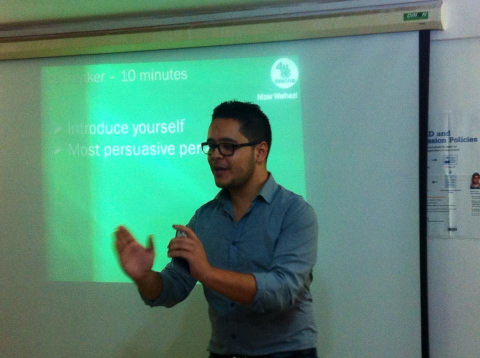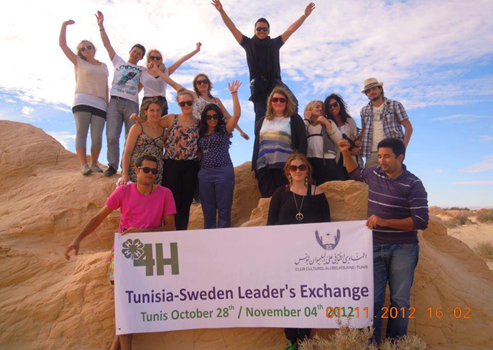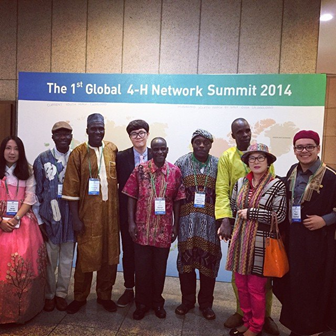4-H around the world: Tunisia 4-H
The series exploring 4-H around the world continues as we explore 4-H in Tunisia.

The Michigan State University Extension series exploring 4-H around the world, first started in 2016, continues! The first article in the series explored 4-H in Africa and mentioned Tunisia as one of the 13 countries in Africa where 4-H (4-K) exists. In this article, we will explore 4-H in Tunisia further with research that Zaineb Nciri, intern for West Virginia University Extension, has conducted.

How did 4-H start in Tunisia?
A second edition National 4-H Club Foundation publication from June 1966, titled World Atlas of 4-H and Similar Rural Youth Educational Programs, shows that Tunisia Rural Youth (Jeunesse Rurale) program was organized in 1965 by the Land Development Office (O.T.D.), Tunis, Tunisia. No further information was available. In the third edition of the publication from October 1970, Tunisia Rural Youth Clubs (Clubs Jeunes Agriculteurs) program of the Union de la Jeunesse (Youth Union) and the Ministère de l'Agriculture (Ministry of Agriculture), 3 rue de Hollande, Tunis, Tunisia, states that 4-H ages were 16-20, enrollment was 600 members and that seven clubs had been founded by 1969.

What does 4-H Tunisia look like now?
During an interview with Nizar Welhazi, the former President of 4-H Tunisia, many questions were answered on how 4-H looks now in Tunisia. He acknowledged that an attempt was made in 1993 to reorganize the 4-H program in Tunisia but it was not sustained. Welhazi relaunched the program in 2011, all on his own, in the small city of Nabeul. After traveling as a tourist in Sweden, he was inspired by Sveriges 4-H (4-H of Sweden), which later served as a great connection to 4-H Tunisia. Upon returning to Tunisia, Welhazi opened a 4-H club with some of his friends.
The political landscape in Tunisia at the time was not helpful in launching 4-H Tunisia. Welhazi’s initial 4-H club was launched only a few months after the Tunisian revolution in 2010-2011. Some political parties wanted to take advantage of the emerging 4-H program, so he felt the need to freeze all action on 4-H Tunisia for eight months in fear of politicizing the club.

Welhazi’s vision for 4-H Tunisia was to offer 4-H to participants free of charge. He forged ahead with zero funding, utilizing volunteers to deliver the activities and trainings. He sought sponsorships to cover expenses with cultural exchanges for the participants. Welhazi was always there to help guide new leadership and members of 4-H Tunisia club initiatives over the course of nine years.
While the club members had to be 18 years of age or older, the work members did was targeted to all age groups, ranging from 12 - 36 and beyond. They provided small activities, culture exchanges across the world, leadership trainings and more. In 2014, Welhazi attended the First Global 4-H Network Summit held in South Korea. It was here that Welhazi met Don Floyd, then president and CEO of National 4-H Council. Welhazi asked how to get 4-H Tunisia officially recognized and Floyd’s response was to “just go for it!”
Over time, Welhazi found that sponsorships for events were getting harder and harder to obtain and future leadership within the organization was not able to maintain activities and events for the 4-H Tunisia program. As a result, 4-H Tunisia is not currently active. However, things are looking up since exchange student Zaineb Nciri (currently interning with the West Virginia University Extension 4-H program) is planning to launch a 4-H club at her university upon her return to Tunisia in the fall of 2024.
Michigan 4-H is excited to continue exploring 4-H nationally and internationally! To follow this MSU Extension article series exploring 4-H around the world, refer to other articles in this series:
- 4-H around the world: 4-S Argentina 4-H
- 4-H around the world: Tanzania
- 4-H around the world: Taiwan
- 4-H around the world: Kansainvälinen 4H
- 4H in Africa: Tanzania, Ghana, Kenya, Ethiopia and South Africa
- 4-H around the world: Trinidad and Tobago 4-H
- 4-H around the world: Canada
- 4-H around the world: South Korea
Michigan State University Extension and the Michigan 4-H Youth Development program help to prepare youth as positive and engaged leaders and global citizens by providing educational experiences and resources for youth interested in developing knowledge and skills in these areas. For more information about 4-H learning opportunities and other 4-H programs, contact your local MSU Extension office. Visit the Michigan 4-H International Exchange Programs for information on hosting exchange students or traveling. Other global educational opportunities can also be found on the MSU Extension global and cultural education webpage.



 Print
Print Email
Email





